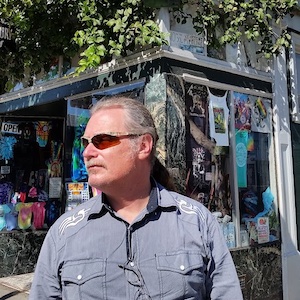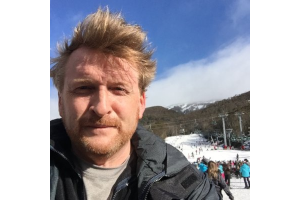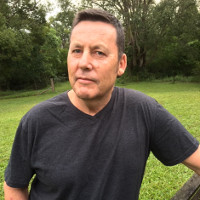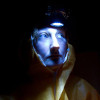By David Horn
The first time it spoke, it used my voice.
I was alone on the flats — copper sky bleeding into dusk, engine ticking as it cooled, air still as stone — when the radio cracked.
“Lyle.”
It stretched like wire straining under a weight. I answered before I thought the better of it.
I found the tracks three hours later. Hindfeet. Toes spread forward. No forepaws. Long stride. Upright gait. It was about the size of a wallaby, but not quite. There were gaps between steps, as if the ground skipped under it. The trail ended mid-step, as if it stepped away from the world.
I took photos, logged them, and drove back.
At the station, I scrubbed through the camera feeds. Wind. Shimmer. Nothing else. Except one. Triggered at 03:17, the frame showed scrub and dust. The audio carried something else.
Voices.
Mine.
An elder’s voice in Yankunytjatjara.
Another in sharp German, with words that snapped like twigs.
I sent the fur to the lab. They couldn’t place it. No match in their records. Proteins twisted out of order. DNA unfit for any branch of the tree. I didn’t call back.
Two nights passed before it returned.
I found it on the edge of the salt pan. Tall. Hunched. Its coat shimmered between velvet and ash. Its face shifted — first canine, then vaguely human. Then something else entirely. Nostrils along the neck. A blink where the mouth should’ve sat.
It spoke.
My wife’s voice. Steady. Unbroken.
“Lyle. Please.”
She had died ten years earlier. The voice held her shape.
I froze. It stood still. Its outline flickered. Then it turned and stepped into the white.
No sound. No tracks.
I found one feather in its place. Long. Translucent. Edges fine as dust. I didn’t touch it.
At dawn, I called Mirri.
She lived outside Mutitjulu and remembered the old things. I told her what I saw. She didn’t blink.
“Yabberjack,” she said. Her voice clipped the word clean. “Walker-between.”
“What does it want?”
She shook her head. “Some things don’t want. They hold.”
“Will it come again?”
“It never left.”
The land was warped. Compass readings drifted east. Radios dropped to silence. Water pulled metallic on the tongue. Wind rolled backward through the range.
I returned to the pan.
The creature stood in the same spot. Taller, somehow. Or I had shrunk.
“Lyle,” it said.
Then: “Listen.”
Its chest cracked. Noise spilled out — layered voices, brittle and deep. A chant. A cry. A breath caught in fire. Words from tongues gone to ash. Sounds shaped by pressure, heat, and grief.
I couldn’t move. The air pressed against me. I heard a child I never held. A name I had buried. A scream that belonged to me, though I didn’t remember giving it.
These voices weren’t echoes. They had survived something.
The Yabberjack didn’t mimic. It carried.
It crossed into our world, trailing everything that couldn’t follow. Forests. Tongues. Generations.
I saw its weight. A vessel with no home. It didn’t seek shelter. It came for witness.
I raised the recorder. Named it aloud.
The Yabberjack dipped its head once.
Then it walked into the salt.
No feather. No tracks. Only one last sound:
My voice, shaped into a language last spoken forty thousand years ago.
I stopped trying to name it. Some things don’t need files or shelves. They need to be remembered.
I kept the tape.
Sometimes, when the sky pulses like a wound, I play it.
And sometimes, it answers.
![]()
About the Author
David Horn
 David Horn writes speculative fiction from the edge of the American Midwest, where the skies are wide and the stories stranger than they should be.
David Horn writes speculative fiction from the edge of the American Midwest, where the skies are wide and the stories stranger than they should be.
His work explores the boundary between memory and myth, often through a lens of ecological or cultural haunting.
He recently published Signals from the Edge, an anthology of original short stories that blend science fiction, folklore, and quiet horror — as well as the satirical Beach Blanket Shark Attack, a loving spoof of 1960s creature features.
When he’s not writing, David works in cybersecurity and plays guitar, mandolin, and banjo with marginal competence and great enthusiasm — sometimes simultaneously, to mixed results.
He lives in Colorado, USA.














 Geraldine Borella writes fiction for children, young adults and adults. Her work has been published by Deadset Press, IFWG Publishing, Wombat Books/Rhiza Edge, AHWA/Midnight Echo, Antipodean SF, Shacklebound Books, Black Ink Fiction, Paramour Ink Fiction, House of Loki and Raven & Drake
Geraldine Borella writes fiction for children, young adults and adults. Her work has been published by Deadset Press, IFWG Publishing, Wombat Books/Rhiza Edge, AHWA/Midnight Echo, Antipodean SF, Shacklebound Books, Black Ink Fiction, Paramour Ink Fiction, House of Loki and Raven & Drake Tim Borella is an Australian author, mainly of short speculative fiction published in anthologies, online and in podcasts.
Tim Borella is an Australian author, mainly of short speculative fiction published in anthologies, online and in podcasts. Alistair Lloyd is a Melbourne based writer and narrator who has been consuming good quality science fiction and fantasy most of his life.
Alistair Lloyd is a Melbourne based writer and narrator who has been consuming good quality science fiction and fantasy most of his life. Merri Andrew writes poetry and short fiction, some of which has appeared in Cordite, Be:longing, Baby Teeth and Islet, among other places.
Merri Andrew writes poetry and short fiction, some of which has appeared in Cordite, Be:longing, Baby Teeth and Islet, among other places.

 Emma Louise Gill (she/her) is a British-Australian spec fic writer and consumer of vast amounts of coffee. Brought up on a diet of English lit, she rebelled and now spends her time writing explosive space opera and other fantastical things in
Emma Louise Gill (she/her) is a British-Australian spec fic writer and consumer of vast amounts of coffee. Brought up on a diet of English lit, she rebelled and now spends her time writing explosive space opera and other fantastical things in
 Mark is an astrophysicist and space scientist who worked on the Cassini/Huygens mission to Saturn. Following this he worked in computer consultancy, engineering, and high energy research (with a stint at the JET Fusion Torus).
Mark is an astrophysicist and space scientist who worked on the Cassini/Huygens mission to Saturn. Following this he worked in computer consultancy, engineering, and high energy research (with a stint at the JET Fusion Torus). Sarah Jane Justice is an Adelaide-based fiction writer, poet, musician and spoken word artist.
Sarah Jane Justice is an Adelaide-based fiction writer, poet, musician and spoken word artist. Ed lives with his wife plus a magical assortment of native animals in tropical North Queensland.
Ed lives with his wife plus a magical assortment of native animals in tropical North Queensland. Barry Yedvobnick is a recently retired Biology Professor. He performed molecular biology and genetic research, and taught, at Emory University in Atlanta for 34 years. He is new to fiction writing, and enjoys taking real science a step or two beyond its known boundaries in his
Barry Yedvobnick is a recently retired Biology Professor. He performed molecular biology and genetic research, and taught, at Emory University in Atlanta for 34 years. He is new to fiction writing, and enjoys taking real science a step or two beyond its known boundaries in his Tara Campbell is an award-winning writer, teacher, Kimbilio Fellow, fiction co-editor at Barrelhouse, and graduate of American University's MFA in Creative Writing.
Tara Campbell is an award-winning writer, teacher, Kimbilio Fellow, fiction co-editor at Barrelhouse, and graduate of American University's MFA in Creative Writing. My time at Nambucca Valley Community Radio began back in 2016 after moving into the area from Sydney.
My time at Nambucca Valley Community Radio began back in 2016 after moving into the area from Sydney.